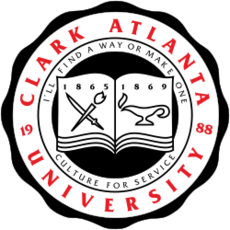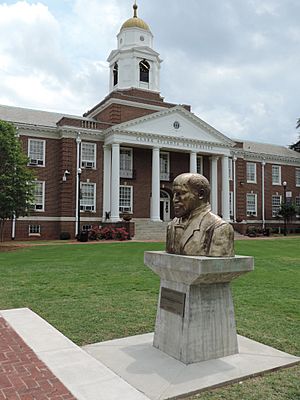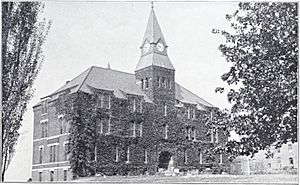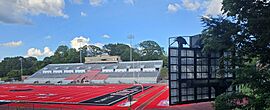Clark Atlanta University facts for kids
 |
|
| Motto | "I'll Find a Way or Make One" (Atlanta University); "Culture for Service" (Clark College) |
|---|---|
| Type | Private historically black research university |
| Established | September 19, 1865 |
|
Religious affiliation
|
United Methodist Church |
|
Academic affiliation
|
|
| Endowment | $102.4 million (2021) |
| President | George T. French Jr. |
| Students | 4,135 (fall 2023) |
| Undergraduates | 3,495 (fall 2023) |
| Postgraduates | 640 (fall 2023) |
| Location |
Atlanta, Georgia
,
U.S.
33°45′3″N 84°24′37″W / 33.75083°N 84.41028°W |
| Campus | Urban, 126 acres (0.5 km2) |
| Newspaper | The CAU Panther |
| Colors | Red, black, gray |
| Nickname | Panthers |
|
Sporting affiliations
|
NCAA Division II, Southern Intercollegiate Athletic Conference |
| Mascot | Panther |
 |
|
Clark Atlanta University (CAU or Clark Atlanta) is a private university in Atlanta, Georgia, USA. It is connected to the United Methodist Church. CAU is also a historically black college or university (HBCU). This means it was founded to provide education for African American students during a time when they faced barriers to higher education.
The university was first started on September 19, 1865, as Atlanta University. It was the very first HBCU in the Southern United States. Later, in 1988, Atlanta University joined with Clark College (which started in 1869) to create Clark Atlanta University. Today, CAU is known for its strong research programs.
Contents
History of Clark Atlanta University
Clark Atlanta University was formed when two important schools, Atlanta University and Clark College, came together. Atlanta University was the first graduate school in the nation to give degrees to African Americans. Clark College was the first four-year college to offer a wide range of subjects to African American students.
How Atlanta University Started
During the American Civil War, in 1862, two African American men who used to be enslaved, James Tate and Grandison B. Daniels, opened the first school for African American children in Atlanta. They held classes in a church building. This school officially became Atlanta University in September 1865.
Later that year, a white missionary named Frederick Ayer and his wife came to Atlanta. They helped the school by getting a boxcar, which is like a train car, to use as a new classroom. Tate and Daniels passed on their leadership to Ayer, who was ready to guide the school's growth.
Atlanta University was officially given its charter, like a permission slip to operate, on October 17, 1867. This happened with help from Edmund Asa Ware, who became the first president, and Oliver Otis Howard from the Freedmen's Bureau. The school began offering college-level classes in 1869. Its first students graduated in 1873, and the first bachelor's degrees were given out in June 1876.
Atlanta University was also one of the first HBCUs to accept women. It even built the first women's dormitory, North Hall, in 1869. Over the years, many women earned degrees from the university.
By 1929, Atlanta University became a graduate school, meaning it focused on degrees after a bachelor's. It joined with other Black colleges in Atlanta, like Morehouse and Spelman, to form the Atlanta University Affiliation. This group grew to include other colleges before World War II. Finally, in 1988, Atlanta University merged with Clark College to become Clark Atlanta University.
Important leaders like Edmund Asa Ware and John Hope helped shape Atlanta University. Also, W. E. B. Du Bois, a famous writer and civil rights leader, taught there from 1897 to 1910. He started important studies about African American life.
How Clark College Started
Clark College was founded in 1869 by the Methodist Episcopal Church. It was the first four-year college in the nation specifically for African American students. The school was named after Bishop Davis Wasgatt Clark.
The first classes were held in a simple room in a church. The school moved a few times before settling on a larger piece of land in South Atlanta in 1880. Clark College started offering college degrees in 1879, and its first bachelor's degree was awarded in 1880.
In 1883, Clark College started a theology department for religious studies. This department later became the Gammon School of Theology, which is now part of the Interdenominational Theological Center. Just like Atlanta University, Clark College also merged to form Clark Atlanta University on July 1, 1988.
Donations and Support
In December 2020, a very generous donation of $15 million was given to Clark Atlanta University by MacKenzie Scott. This was the largest single gift the university had ever received.
In September 2021, Clark Atlanta started a big fundraising effort to collect $250 million over ten years. This money will help students with scholarships, support research, improve campus buildings, and create more teaching positions.
University Presidents
The current president of Clark Atlanta University is George T. French Jr.. He started his role in 2019.
Campus Life
Clark Atlanta University's main campus has 37 buildings and covers about 126 acres. It is located southwest of Downtown Atlanta.
Gaines Hall
Atlanta University began on West Mitchell Street. Built in 1869, North Hall, now called Gaines Hall, was the very first dormitory for women at a co-ed school in the United States. It was the first building made specifically for Atlanta University. A year later, South Hall opened for boys.
Fountain Hall
Fountain Hall, built in 1882, is one of the oldest buildings on the original Atlanta University campus. It is very important because it helped provide higher education for African Americans. In 1975, Fountain Hall was named a National Historic Landmark.
This building was designed by G. L. Norrman, a famous Atlanta architect. It is a three-story red brick building with a unique clock tower. From 1882 to 1929, Fountain Hall was mainly the administration building for Atlanta University. It also had a chapel, library, and classrooms.
Later, in the 1930s, Morris Brown College began using the building. It was renamed Fountain Hall after Bishop William A. Fountain, who helped Morris Brown College become part of the university system. Fountain Hall is a well-known landmark in the historic Atlanta University Center.
Student Housing
All undergraduate students who have fewer than 58 credit hours are required to live on campus in the university's dorms.
Academics and Learning
| USNWR National University | 361 |
|---|---|
| Washington Monthly National University | 161 |
Clark Atlanta offers many different degrees, from bachelor's to master's and doctoral degrees. Students can study in various schools:
- School of Arts & Science
- School of Business
- School of Education
- School of Social Work
Clark Atlanta is known for being a top HBCU. Its social work graduate program is often ranked among the best in the country. The university's Center for Functional Nanoscale Measures (CFNM) has helped more Black students earn Ph.D.s in Nanoscale Science than any other HBCU.
The Isabella T. Jenkins Honors Program is a special program for high-achieving students. It offers a unique and challenging learning environment.
Student Life
Student Body
Each year, about 30 to 40% of students come from Georgia, while the rest come from other states or countries. Around 25% of students are male and 75% are female. In 2018, most students identified as African-American/Black. Many first-year students receive financial help to pay for college.
Sports and Athletics
Clark Atlanta University's sports teams are called the Panthers. They compete in the Southern Intercollegiate Athletic Conference (SIAC) as part of the National Collegiate Athletic Association (NCAA), Division II.
Men's sports include baseball, basketball, cross country, football, and track & field. Women's sports include basketball, cross country, softball, tennis, track & field, and volleyball.
Marching Band
The university has a famous marching band known as the Mighty Marching Panther Band.
Fraternities and Sororities
Clark Atlanta University has chapters of all nine National Pan-Hellenic Council organizations. These are social and service groups for students.
Famous People from CAU
Many notable people have graduated from or worked at Clark Atlanta University.
See also




